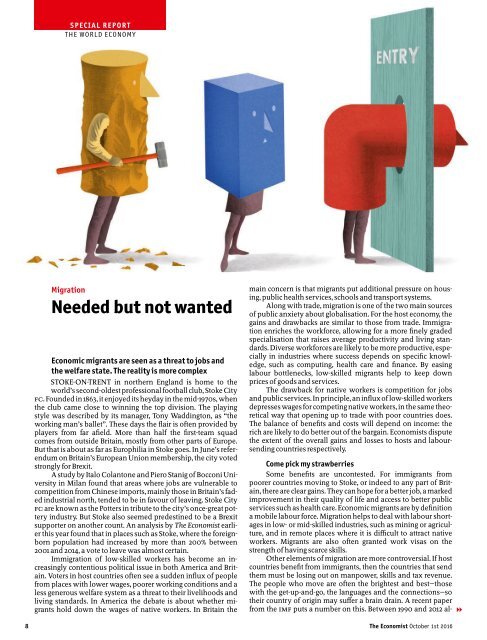You also want an ePaper? Increase the reach of your titles
YUMPU automatically turns print PDFs into web optimized ePapers that Google loves.
SPECIAL REPORT<br />
THE WORLD ECONOMY<br />
Migration<br />
Needed but not wanted<br />
Economic migrants are seen as a threat to jobs and<br />
the welfare state. <strong>The</strong> reality is more complex<br />
STOKE-ON-TRENT in northern England is home to the<br />
world’s second-oldest professional football club, Stoke City<br />
FC. Founded in 1863, it enjoyed its heyday in the mid-1970s, when<br />
the club came close to winning the top division. <strong>The</strong> playing<br />
style was described by its manager, Tony Waddington, as “the<br />
working man’s ballet”. <strong>The</strong>se days the flair is often provided by<br />
players from far afield. More than half the first-team squad<br />
comes from outside Britain, mostly from other parts of Europe.<br />
But that is about as far as Europhilia in Stoke goes. In June’s referendum<br />
on Britain’s European Union membership, the city voted<br />
strongly for Brexit.<br />
A study by Italo Colantone and Piero Stanig ofBocconi University<br />
in Milan found that areas where jobs are vulnerable to<br />
competition from Chinese imports, mainly those in Britain’s faded<br />
industrial north, tended to be in favour of leaving. Stoke City<br />
FC are known as the Potters in tribute to the city’s once-great pottery<br />
industry. But Stoke also seemed predestined to be a Brexit<br />
supporter on another count. An analysis by <strong>The</strong> <strong>Economist</strong> earlier<br />
this year found that in places such as Stoke, where the foreignborn<br />
population had increased by more than 200% between<br />
2001and 2014, a vote to leave was almost certain.<br />
Immigration of low-skilled workers has become an increasingly<br />
contentious political issue in both America and Britain.<br />
Voters in host countries often see a sudden influx of people<br />
from places with lower wages, poorer working conditions and a<br />
less generous welfare system as a threat to their livelihoods and<br />
living standards. In America the debate is about whether migrants<br />
hold down the wages of native workers. In Britain the<br />
main concern is that migrants put additional pressure on housing,<br />
public health services, schools and transport systems.<br />
Along with trade, migration is one of the two main sources<br />
of public anxiety about globalisation. For the host economy, the<br />
gains and drawbacks are similar to those from trade. Immigration<br />
enriches the workforce, allowing for a more finely graded<br />
specialisation that raises average productivity and living standards.<br />
Diverse workforces are likely to be more productive, especially<br />
in industries where success depends on specific knowledge,<br />
such as computing, health care and finance. By easing<br />
labour bottlenecks, low-skilled migrants help to keep down<br />
prices ofgoods and services.<br />
<strong>The</strong> drawback for native workers is competition for jobs<br />
and publicservices. In principle, an influxoflow-skilled workers<br />
depresses wages forcompetingnative workers, in the same theoretical<br />
way that opening up to trade with poor countries does.<br />
<strong>The</strong> balance of benefits and costs will depend on income: the<br />
rich are likely to do better out of the bargain. <strong>Economist</strong>s dispute<br />
the extent of the overall gains and losses to hosts and laboursending<br />
countries respectively.<br />
Come pick my strawberries<br />
Some benefits are uncontested. For immigrants from<br />
poorer countries moving to Stoke, or indeed to any part of Britain,<br />
there are cleargains. <strong>The</strong>y can hope fora betterjob, a marked<br />
improvement in their quality of life and access to better public<br />
services such as health care. Economic migrants are by definition<br />
a mobile labour force. Migration helps to deal with labour shortages<br />
in low- or mid-skilled industries, such as mining or agriculture,<br />
and in remote places where it is difficult to attract native<br />
workers. Migrants are also often granted work visas on the<br />
strength ofhaving scarce skills.<br />
Other elements ofmigration are more controversial. Ifhost<br />
countries benefit from immigrants, then the countries that send<br />
them must be losing out on manpower, skills and tax revenue.<br />
<strong>The</strong> people who move are often the brightest and best—those<br />
with the get-up-and-go, the languages and the connections—so<br />
their country of origin may suffer a brain drain. A recent paper<br />
from the IMF puts a number on this. Between 1990 and 2012 al-<br />
1<br />
8 <strong>The</strong> <strong>Economist</strong> October 1st 2016


